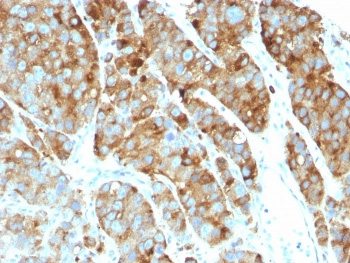- Tel: 858.663.9055
 Email: info@nsjbio.com
Email: info@nsjbio.com
- Tel: 858.663.9055
- Email: info@nsjbio.com
Endosomes are crucial membrane-bound organelles responsible for the internalization, sorting, and trafficking of cellular material. They are central to a variety of processes such as receptor recycling, antigen presentation, and intracellular signaling regulation. A proper understanding of endosome function and their associated markers is essential for studying cellular processes like endocytosis, autophagy, and disease pathology.
Endosome Marker Antibodies serve as critical tools for the specific identification and study of endosomal compartments. These antibodies help researchers better understand how endosomes interact with other organelles, regulate cargo trafficking, and contribute to various diseases, such as cancer, neurodegenerative disorders, and viral infections.
Endosomal trafficking involves a variety of specialized proteins that function at different stages of endosome maturation. Endosome Marker Antibodies can be used to target these proteins and reveal the complex processes involved in cellular homeostasis. Some key Endosome Marker Antibodies target the following important proteins:
Rab5: A small GTPase critical for early endosome formation and membrane fusion. Endosome Marker Antibodies to Rab5 are commonly used to mark early endosomes and investigate their interactions with other cellular structures.
EEA1: Early Endosome Antigen 1 (EEA1) is essential for the docking and fusion of early endosomes with other vesicles. Endosome Marker Antibodies to EEA1 are vital for studying the dynamics of early endosomal compartments.
Clathrin: An essential protein involved in the formation of clathrin-coated vesicles, which mediate receptor internalization into endosomes. Endosome Marker Antibodies targeting clathrin are frequently used to assess receptor-mediated endocytosis and endosomal sorting.
LAMP1: Lysosomal-associated membrane protein 1 (LAMP1) is a major component of late endosomes and lysosomes. Endosome Marker Antibodies against LAMP1 are useful for studying the maturation and degradation processes in late-stage endosomes.
VPS34: A phosphoinositide kinase involved in the regulation of autophagosomes and endosome maturation. Endosome Marker Antibodies to VPS34 help elucidate the role of endosomal membranes in autophagy and vesicular trafficking.
These proteins are integral to the functionality of endosomes, making Endosome Marker Antibodies essential for accurate identification and detailed analysis of endosomal trafficking in cells.
Endosome Marker Antibodies are indispensable tools for investigating the cellular processes related to endosomes. Here are some common techniques where Endosome Marker Antibodies are employed:
Western blotting with Endosome Marker Antibodies allows for the identification and quantification of endosomal proteins, enabling the study of endosomal protein expression in cell or tissue samples. This method is ideal for confirming the presence and abundance of key endosomal markers in specific cellular contexts.
Endosome Marker Antibodies in immunohistochemistry allow researchers to study the localization of endosomal proteins in tissue samples. By staining sections of tissue, researchers can track how endosomes interact with other compartments like the lysosomes, mitochondria, and the plasma membrane.
Using Endosome Marker Antibodies in immunofluorescence provides insights into the distribution and dynamics of endosomes in live or fixed cells. Fluorescently labeled Endosome Marker Antibodies allow real-time visualization of the movement and behavior of early and late endosomal compartments.
Flow cytometry is another powerful technique for studying endosomal proteins. Endosome Marker Antibodies can be used in flow cytometry to quantitatively analyze the expression of endosomal proteins in single-cell populations, making it a high-throughput method for cellular analysis.
For high-resolution imaging, Endosome Marker Antibodies paired with electron microscopy allow for the detailed visualization of endosomal morphology. This technique is invaluable for observing the fine structure of endosomes, such as their size, shape, and sub-compartmental organization.
Utilizing high-quality Endosome Marker Antibodies ensures that your research on endosomal dynamics and function is accurate and reliable. Our Endosome Marker Antibodies are rigorously tested for a variety of assays, including Western blotting, immunohistochemistry, immunofluorescence, flow cytometry, and electron microscopy.
Whether you are investigating early and late endosomal protein markers, studying receptor-mediated endocytosis, or exploring endosome maturation in specific disease contexts, our Endosome Marker Antibodies provide the specificity and sensitivity required for your research.
Discover our range of Endosome Marker Antibodies and take your research to the next level in understanding the essential roles endosomes play in cellular processes.

IHC: Formalin-fixed, paraffin-embedded human prostate carcinoma stained with CD63 / LAMP-3 antibody (clone LAMP3/968, cat # V3029).